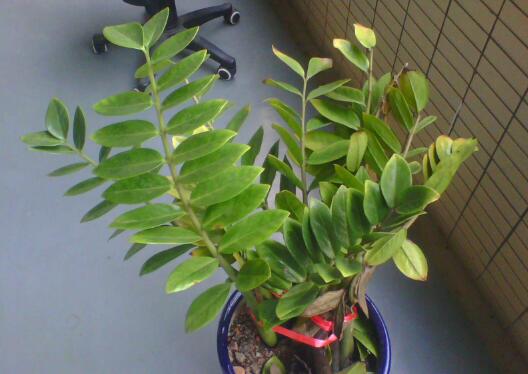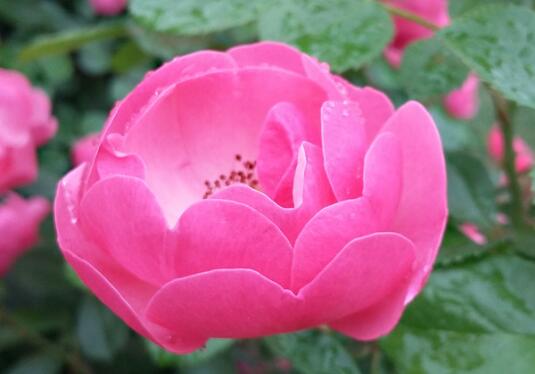Control methods of insect pests in flowers and plants
Almost all flowers are vulnerable to shell insects, and there are many kinds of them, such as red wax scale, ball firm scale, horn wax scale, blow cotton scale, Yagian scale, mulberry white scale, cactus scale, bamboo flat scale and so on. Scale insects often gather on branches, leaves, flowers and fruits. Adults and nymphs use their special □ devices to pierce the flower tissue to absorb juice, leaving irregular yellow spots on the leaves, which will dry up the leaves, shrivel the fruits, and induce coal fouling disease. Control measures: in the incubation period, when the nymph is not fixed, spray omethoate or dichlorvos once a week, 3-4 times in a row, it will be effective. Spraying oil emulsion for wine in spring has a definite control effect. In addition, it is also effective to irrigate the root with 500 times dichlorvos, or to apply 3-10 g 10% carbofuran in pot. A small amount of shell insects can be scraped off with bamboo, and the branches with high □ density should be removed, and the dense branches should be removed to enhance ventilation and light transmission.

Control methods of flower scale insects in spring
Flower scale insects in spring: there are many species of scale insects, which are harmful to flowers and trees, and they are the most pests. Tortoise shell scale, white lipid, round. Mulberry white scale, white, pointed. Oyster scale, dark brown, long-shaped male and round female. Armor scale, dark brown, round, shaped like armor. Plants vulnerable to shell insects are camellia, pomegranate, oleander, rhododendron, hibiscus, cherry blossom, plum, peach, begonia, rose and so on. The larvae first suck the sap on the leaves to make the leaves green, and when adults, they mostly suck sap on the branches, which seriously weakens the tree potential and affects flowering.
Control method: squeeze to death by hand or scrape off the pests on the leaves and branches with a knife, spray 1000 times 40% dimethoate emulsion once or twice in the larval stage, with an interval of 7 to 10 days.
Prevention and control of flower diseases and insect pests aphids, red spiders and shell insects are the most common piercing pests that harm flowers and trees. They do harm to many kinds of flowers and trees, whether they are woody flowers such as Milan, jasmine, rose, Michelia, plum blossom, or herbaceous flowers such as chrysanthemum, geranium, balsam flower and so on.
Aphids, also known as armyworm, occur all the year round, and generally multiply most rapidly at a temperature of about 39 ℃. There are many kinds of aphids, usually green, yellow, black, brown, harmful to rose, pomegranate, chrysanthemum, gardenia and other flowers. They gather more on the buds, leaves or twigs of the plant. Endlessly sucking the juice, harming the bud heart and petals. The branches and leaves of the injured plants are yellow and deformed, the buds are rotten, the flowering period is shortened, the flower volume is reduced, and in serious cases, the plants will wilt and die. Prevention and control methods:
(1) use 50 grams of fresh chili or dry red wine chili peppers, add 30-50 grams of water, cook for about half an hour, and sprinkle the damaged plants with its filtrate.
(2) 3-4 grams of washing powder, 100 grams of water, stirred into a solution, sprayed 2-3 times continuously, and the control effect reached 100%.
(3) add 600-800 times water solution with "wind oil essence" and carefully spray the insect pests with a sprayer so that the insect body is stained with potions. The effect of killing aphids and shell insects and other pests is more than 95%, and will not cause drug damage to the plant.
(4) the detergent, urea and water are mixed into a mixture according to the ratio of 1 / 4 / 100, and the plant is sprayed with it, which can kill insects and fertilize two birds with one stone.
Red spider
Red spiders, also known as short-whisker mites, are pests that specifically harm the leaves and plants of flowers. Wild elm, sparrow plum and five-needle pine in bonsai are also vulnerable to red spiders. The red spider's body is the size of a needle, crimson or purplish red, only red dots can be seen with the naked eye, and orange transparent globular eggs can only be seen under a magnifying glass. Its nymphs often gather on the leaf backs and buds of some flowers and damage the plants by sucking juice from the sucking mouthparts. The initial symptoms of flowers are chlorosis of leaves and upward rolling of leaf edges, resulting in withering and shedding, resulting in early atrophy of buds and plant death in severe cases. Red spiders produce 7-8 generations a year, and the damage begins from March to April every year, and is serious from June to July. Therefore, after the end of April, the plants should be observed and inspected frequently. Under the condition of high temperature, high humidity and poor ventilation, red spiders reproduce very fast, which is one of the important causes of plant death. Prevention and control measures:
The main results are as follows: (1) soaking citrus peel with water about 10 times for one day and night, spraying plants after filtration can control aphids and red spiders, such as watering soil can prevent nematodes in the soil.
(2) 15 grams of washing powder, 15 milliliters of 20% caustic soda, 7.5 kilograms of water, mixed and sprayed. One or two days later, the red spider was full, and the mortality rate of nymph mites was 94%. 98%.
(3) take 50 grams of plant ash, add 2500 grams of water, fully stir, soak and filter for two days and nights, add 3 grams of washing powder to adjust and spray, once a day, for three consecutive days, and spray for three days every other week, the second generation pests can be eliminated. it can also control prick-sucking pests such as aphids, red spiders and shell insects. Put into the scholar can control maggots.
(4) A plate of mosquito-repellent incense is ignited, placed in a pot of diseased plants, and then tied tightly with a plastic bag. After smoking for about an hour, both eggs and adults can be killed. This is a good way to save money and get quick results.
The body of the scale insect is wrapped in a horny carapace, and it is not effective if it is sprayed directly with drugs. Like lice sucking on human blood, shell insects absorb the sap of plants, thus causing great harm to flowers and trees. The injured plants not only grow poorly, but also have yellowing leaves and early defoliation. In serious cases, the plant will wither and die. The endangered flowers are Milan, jasmine, camellia, Michelia and so on. Prevention and control methods:
The main results are as follows: (1) mix liquor with water at 1:2. When controlling insects, water through the surface of the basin soil. The scale insect begins to move when the room temperature is 7 ℃ in spring, and can be poured once in the middle of April, and then every half a month or so, and has been effective for four consecutive times.
(2) with 50 ml of vinegar (rice vinegar), soak the small cotton balls in vinegar and gently wipe the damaged stems and leaves with wet cotton balls to wipe off the scale insects. This method is convenient and safe, which can not only achieve the purpose of disinfestation, but also make the damaged leaves return to green light.
(3) by gently scrubbing the diseased plant with alcohol, the shell worm can be removed, and it can be removed very clean and thoroughly. For example, when you rub the diseased leaves of orchids with alcohol, you can not only get rid of the scale insects, but also completely kill the larvae that are not visible to the naked eye, and the harm of scale insects is rarely found the following year. This method is simple, safe and effective.
(4) the mother liquor is made from diesel oil, washing powder and water in the proportion of 10 / 0.6 / 0.6. At this time, the mother liquor contains 60% milk. After diluting 30% of the solution with water, the scale insects on Milan, kumquat and cycad are carefully sprayed. After a week, most of the scale insects changed from fresh orange to withered state, indicating that this method has a good control effect on scale insects.
- Prev

What about the yellowing of Citrus leaves, hydration / shading / temperature control / humidification / control of diseases and insect pests
Among the functions and effects of Citroe taro, it can be said that the most well-known is its ornamental value. It is an indoor foliage plant with good meaning, so many people will choose to raise one at home. However, if the leaves of plants with high ornamental quality turn yellow, their overall aesthetic feeling will also be affected.
- Next

The difference between Fujimoto rose and rose is very different in appearance / florescence / reproduction.
Fujimoto rose and rose are two completely different plants, but because they are plants of the same family and have a certain degree of similarity in appearance, they are often easily confused by people. in fact, if you look closely, there are still many differences between the two plants. What are the specific differences between the rattan rose and the rose
Related
- Fuxing push coffee new agricultural production and marketing class: lack of small-scale processing plants
- Jujube rice field leisure farm deep ploughing Yilan for five years to create a space for organic food and play
- Nongyu Farm-A trial of organic papaya for brave women with advanced technology
- Four points for attention in the prevention and control of diseases and insect pests of edible fungi
- How to add nutrient solution to Edible Fungi
- Is there any good way to control edible fungus mites?
- Open Inoculation Technology of Edible Fungi
- Is there any clever way to use fertilizer for edible fungus in winter?
- What agents are used to kill the pathogens of edible fungi in the mushroom shed?
- Rapid drying of Edible Fungi

